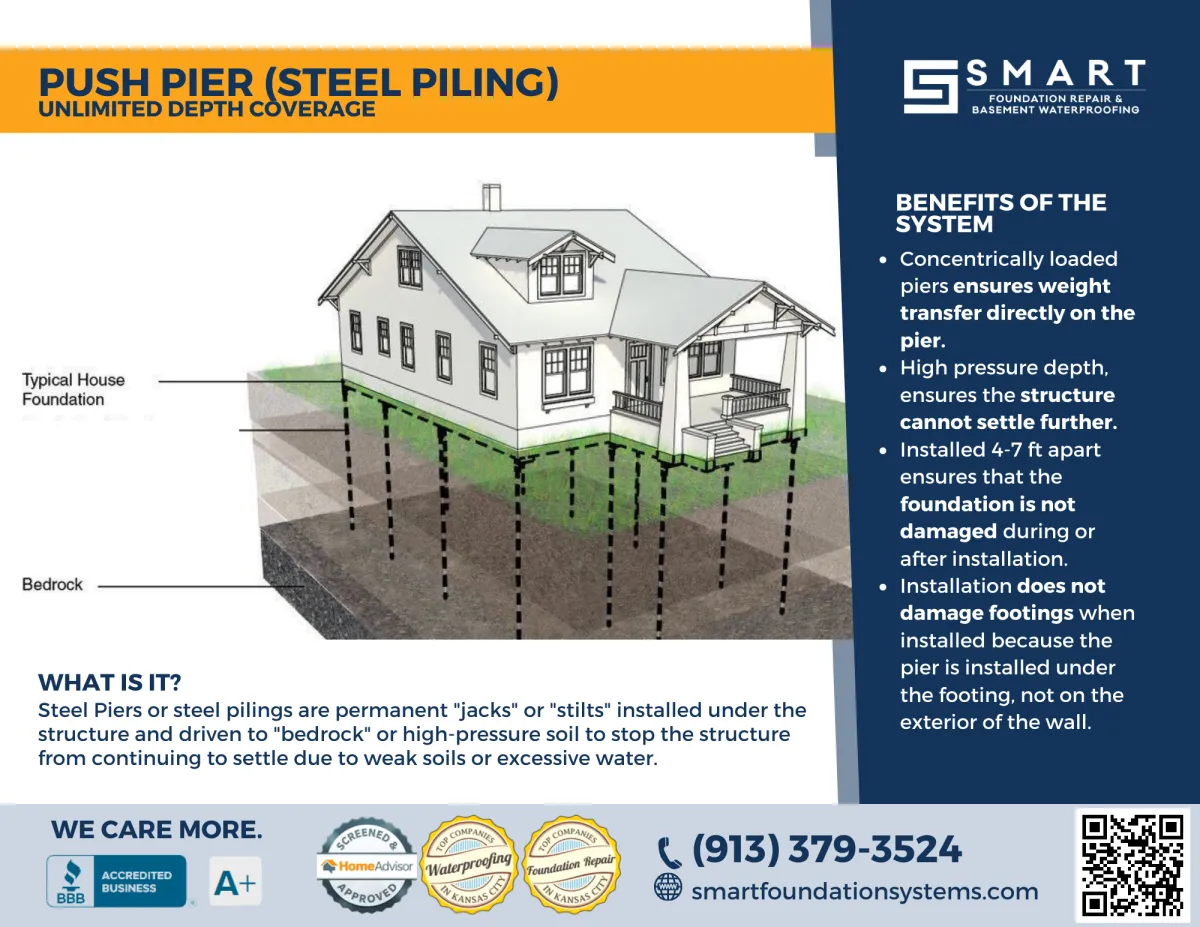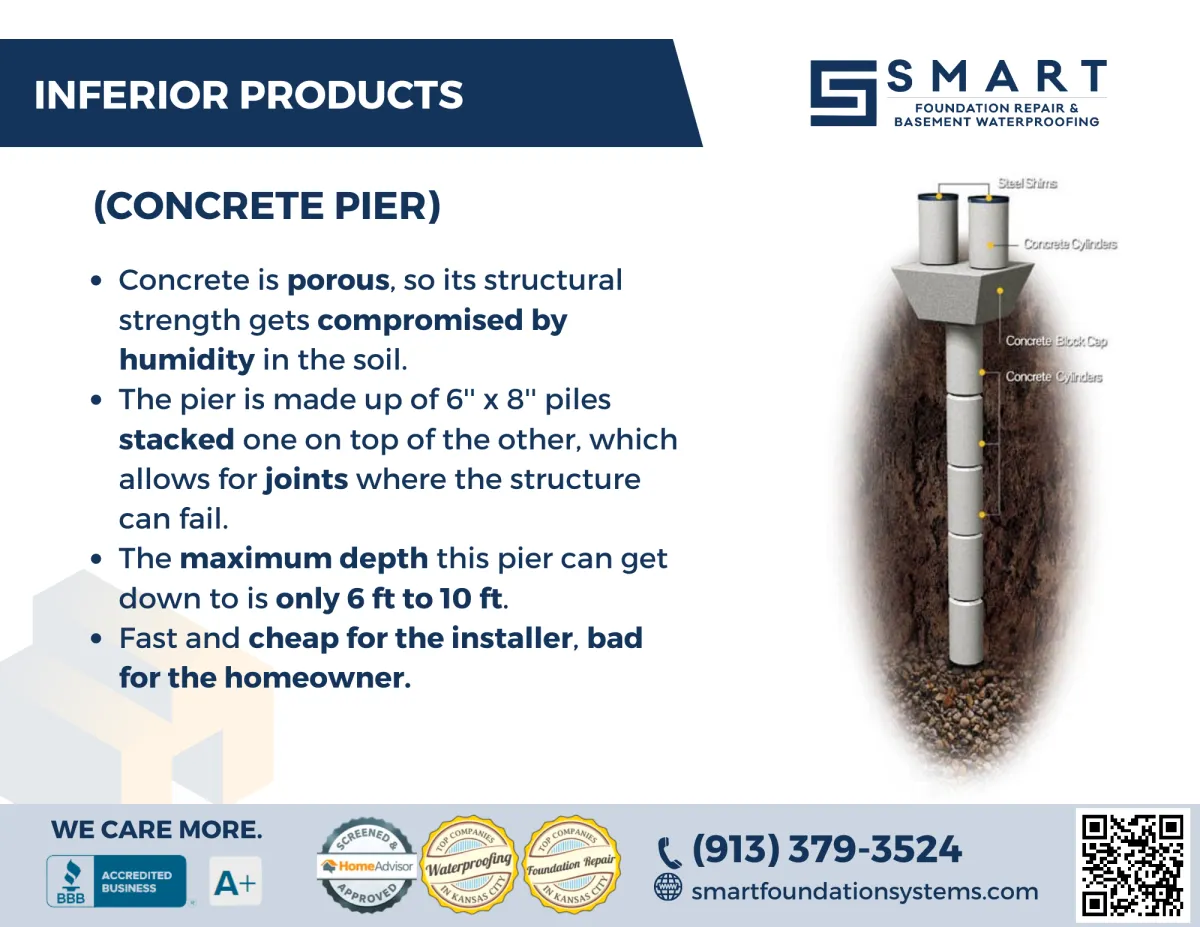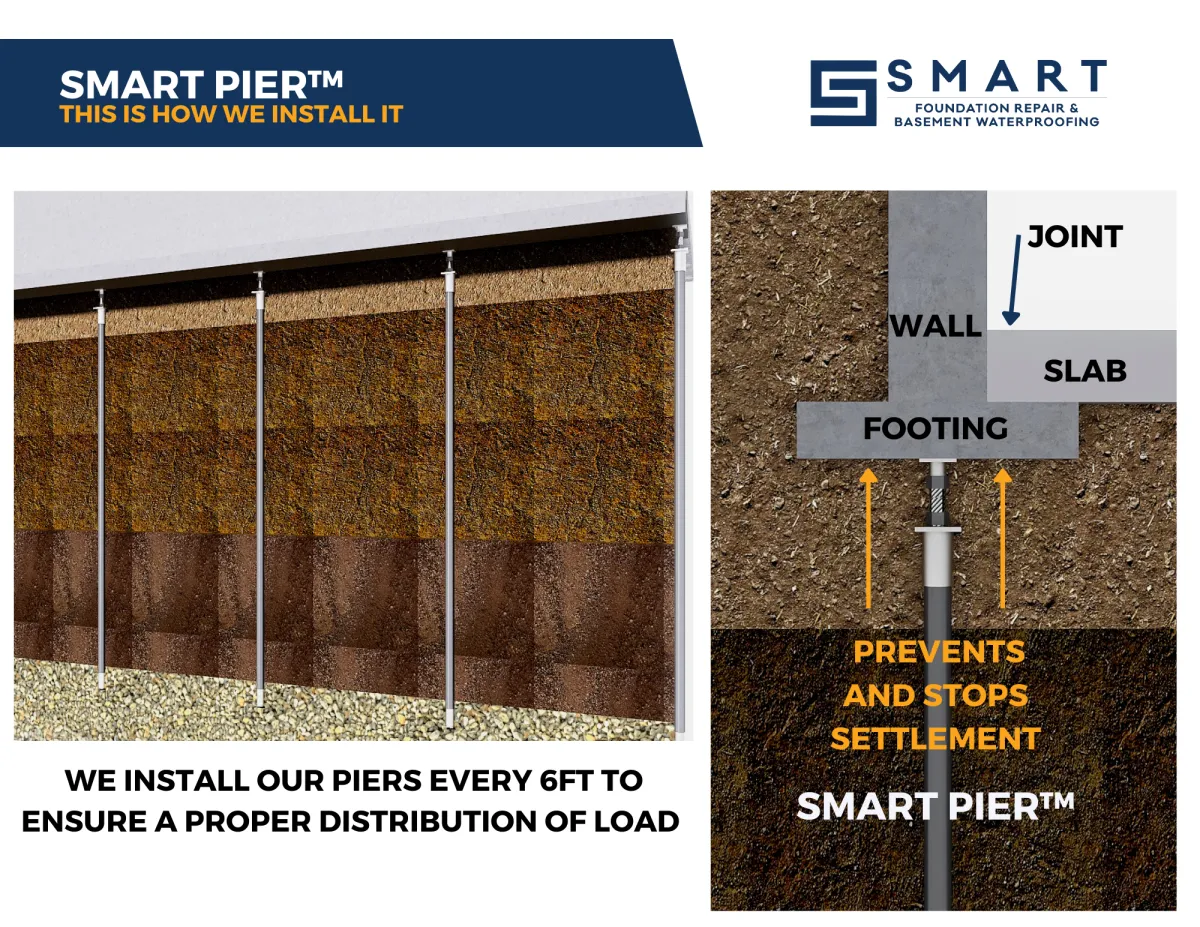Call or Text
Call or Text
Resilient & Durable Foundation Piers in Kansas City
Our long-lasting foundation piers in Kansas City help stabilize a building's foundation and prevent it from settling, thereby reducing future damage and decreasing the likelihood of additional repairs, ensuring your property's foundation remains secure and robust for years to come.
10 Questions on Foundation Piers
What are foundation piers?
Why are foundation piers necessary?
What types of foundation piers are available?
Are foundation piers covered by insurance in the event of damage?
How long does it take to install foundation piers?
How much do foundation piers cost?
What are the most common materials used for foundation piers?
How deep do foundation piers have to be installed?
Can foundation piers prevent future foundation problems?
What is the warranty for foundation piers?

1. What are foundation piers?
Foundation piers are structural elements that are installed beneath a building's foundation in order to provide additional support and stability. They are typically used when a building's foundation is settling (moving downward) or heaving (moving upward). This can be due to a number of factors, including soil settling, poor construction practices, excessive moisture in the soils around your home due to poor drainage, or ground water issues.
Foundation piers are typically made from materials such as concrete, steel, or wood. They can be installed using a variety of techniques, including drilling, excavation, or hydraulic jacking. The type of pier that is used will depend on a number of factors, including the type of soil that the building is built on, the weight of the structure above, and the extent of the damage to the foundation.
The installation of foundation piers can help stabilize a building's foundation, preventing further damage and reducing the likelihood of costly repairs. In some cases, foundation piers can even be used to lift a sinking foundation back to its original position, restoring the structural integrity of the building.
2. Why are foundation piers necessary?
Foundation piers are necessary when the soil under a building's foundation is no longer able to support the weight of the structure above. If the foundation is not properly supported from the soil, it can lead to a number of serious problems, including cracked walls and floors, uneven floors, doors and windows that don't open or close properly, and even damaging the roof and framing, In extreme cases, the building can even collapse.
By installing proper foundation piers early and in the right places, this can limit, reduce, or completely resolve all future settlement, depending on the quantity and quality of the piers installed around the home or business.

3. What types of foundation piers are available?
There are several types of foundation piers available, including concrete piers, steel piers, and helical piers.
Foundation piers in Kansas City are usually available as:
Concrete (rarely installed due to their brittle nature and inability to push to proper depths),
Eccentrically loaded (attached to the outside of the foundation wall),
Concentric (the piers that are installed underneath the footing).
Due to eccentrically loaded piers damaging the footing (the most important part of the foundation) and concrete piers only going to very shallow depths, we HIGHLY recommend the installation of concentrically loaded piers that are installed below the footing and require more labor to excavate completely beneath the footing.
Helical piers are a newer type of foundation pier that is often used in areas with expansive soils. They are installed by drilling a helical shaft into the ground beneath the foundation. The helix-shaped plate at the end of the shaft provides additional stability and support.
It's important to consult with a professional to determine the best type of foundation pier for your particular situation. Helical piers are best used for light structures, as they are also limited in the depth that they can travel.

4. Are foundation piers covered by insurance?
Piers for foundations are frequently not covered by insurance. However, it's worth reviewing your insurance policy to see if there are any provisions for foundation repair or replacement. In most cases, the cost of foundation repair will be the homeowner's responsibility. The cost of foundation piers can vary depending on a number of factors, including the type of pier that is used, the extent of the damage to the foundation, and the location of the building.
It's important to get a quote from a professional in order to determine the cost of your particular project.
5. How long does it take to install foundation piers?
The length of time it takes to install foundation piers can vary depending on a number of factors, including the type of pier that is being used, the extent of the damage to the foundation, and the size of the building. In general, the installation process can take anywhere from a few days to a few weeks.
The first step in the installation process is to excavate the area around the foundation in order to access the soil beneath. Once this is done, the foundation piers can be installed using a variety of techniques, normally through hydraulic jacking. The installation process can be time-consuming and labor-intensive, but it is essential for the stability and safety of the building.
6. How much do foundation piers cost?
The cost of foundation piers can vary depending on a number of factors, including the type of pier that is used, the extent of the damage to the foundation, and the location of the building. In general, the cost of foundation piers can range from a few thousand dollars to tens of thousands of dollars. Typically, high-quality steel push pier installation starts around $1,600 per pier and goes up to $2,000–$2,500 per pier, depending on factors related to limited access. The piers must also be installed every 4–7 feet in the affected areas.
Concrete piers are generally the most affordable option, with prices ranging from $1,000 to $1,500 per pier. The price of the pier will vary from contractor to contractor, depending on the type of pier they install and the brand of pier they install. Most piers that companies install are not third-party tested and engineered to last. Most are not even able to get proper permits for their piers because they have not been third-party tested by a reputable engineer.
It's important to note that the cost of foundation piers is a significant investment, but they are essential for the stability and safety of the building. It's important to get a quote from a professional in order to determine the cost of your particular project.
In general, foundation piers can help prevent future foundation problems by providing additional support and stability to the foundation. However, it's important to note that foundation piers are not a cure-all solution for all foundation issues. In some cases, additional repairs or maintenance may be necessary to ensure the long-term stability and safety of the building. The warranty for foundation piers can vary depending on the manufacturer and the type of pier that is used. It's important to consult with a professional to determine the best course of action for your particular situation.
7. What makes our pier different?
It is important to remember that no two piers are created equal. There are many small companies that cheaply manufacture piers without receiving 3rd party testing, engineering, and they do not pull permits when installing the piers.
Our foundation pier in Kansas City has been tested up to 5 times more than the average pressure most piers are rated to support before beginning to fail, making it the strongest pier on the market. Our pier is also concentrically loaded, meaning that we do not have to damage the footing of the home to install it. We have removed and replaced numerous eccentrically loaded piers and concrete piers, due to their failures.
We simply prefer to do your project once. We warranty it for the life of the structure, so we want to make sure it is done right.

8. How deep do foundation piers have to be installed?
The depth at which foundation piers need to be installed can vary depending on a number of factors, including the type of soil that the building is built on, the weight of the structure above, and the extent of the damage to the foundation. In general, foundation piers should be installed deep enough to reach stable soil that is capable of supporting the weight of the building.
For example, if the building is built on expansive soils that are prone to significant movement, the foundation piers may need to be installed at a depth of 20 feet or more. On the other hand, if the building is built on more stable soils, the piers may only need to be installed at a depth of 5-10 feet.
It's important to note that the depth of the piers is not the only factor that determines their effectiveness. The type of pier that is used, the spacing between the piers, and the method of installation can all have an impact on the stability and safety of the building. It's important to consult with a professional to determine the best course of action for your particular situation.
9. Can foundation piers prevent future foundation problems?
Foundation piers can help prevent future foundation problems by providing additional support and stability to the foundation. When a building's foundation is no longer able to support the weight of the structure above, it can lead to a number of serious problems, including cracked walls and floors, uneven floors, and doors and windows that don't open or close properly. If left untreated, these problems can become more severe over time and even lead to the collapse of the building.
Foundation piers provide additional support and stability to the foundation, helping to prevent further damage and reducing the likelihood of costly repairs. By stabilizing the foundation, they can also prevent future foundation problems from occurring. However, it's important to note that foundation piers are not a cure-all solution for all foundation issues. In some cases, additional repairs or maintenance may be necessary to ensure the long-term stability and safety of the building.
The effectiveness of foundation piers in preventing future foundation problems will depend on a number of factors, including the type of pier that is used, the extent of the damage to the foundation, and the method of installation. It's important to consult with a professional to determine the best course of action for your particular situation. By working with a professional, you can ensure that your foundation is properly stabilized and that your building is safe and secure for years to come.
10. What is the warranty for foundation piers?
The warranty for foundation piers can vary depending on the manufacturer and the type of pier that is used. In general, most foundation pier manufacturers offer a 10-year warranty. However, here at Smart Foundation Repair and Basement Waterproofing, all our pier warranties are for the life of the structure and are fully transferable to the next owner if you ever decide to move.
Put your trust in the best foundation repair company in Kansas City for unmatched service and results.
Contact us today by phone, text, or here!
Foundation issues?
Request a free inspection today.

Business Information
Smart Foundation Repair and Basement Waterproofing Kansas City
5520 Raytown Rd, Raytown, MO 64133
(816) 666-8415
Copyright © Smart Foundation Repair and Basement Waterproofing - 2024



